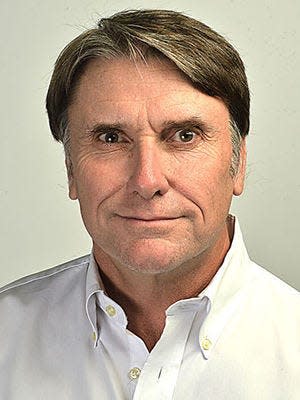Jimmy Buffett's passing leaves us with music, memories and his youthful grin
- Oops!Something went wrong.Please try again later.
The greatest job in the world, I always felt, was the crime writer for the Key West newspaper. Key West had Florida Man before Florida Man became a thing, and the scofflaws had an irresistible blend of charm and stupidity that showed in their work. Alcohol was usually a factor. Or nudity, or both.
The criminals were not geniuses. First, everyone knew everybody — the Key West Citizen for a lot of years focused on national coverage only, because in the days of Hemingway people got word of local happenings by way of the Coconut Telegraph as soon as they happened.
It was not unknown, therefore, for a bank robber to become engaged in a congenial conversation with the teller about the family, recent fishing trips or what have you. There being only one road out of town, Route 1, also known as U.S. 1, the job of police chief was not hard; all he had to do was radio a department 20 miles up the road to be on the lookout for the getaway vehicle. (I once asked a local where to find good seafood, and he pointed to Route 1 and said, “Sure, take that road and drive until you see a sign that says “Maine.”)

Jimmy Buffett, who died over the weekend at a youthful 76, was gone, but very much in the Key West consciousness by then. Fausto’s, referenced in “My Head Hurts, My Feet Stink and I Don’t Love Jesus,” was just a simple store with no music and no, God forbid, website. Buffett’s Margaritaville Cafe, which it might be said launched a commercial empire, was cramped and, to quote Yogi Berra, so crowded that nobody goes there anymore.
Musicians looking for their own break were clearly irritated at constantly being asked to play “Margaritaville.” One pointedly wrote a song called “Jimmy Buffett He Don’t Live in Key West Anymore.”
The inference was that Jimmy had sold out, gone big, gone commercial. As if this particular minstrel wouldn’t have done the same were he good enough. But in a way he was right. Jimmy Buffett would go on to bigger things, but not better things. The soul of his career and the feeling he captured in those pre-xylophone, pre-pun Key West years were musical lightning in a bottle.
If you had caught on to Jimmy Buffett in his “White Sport Coat and a Pink Crustacean” years (a stuffy critic once called him “too clever for his own good”) there was bound to be a hint of resentment at his subsequent cult status. Jimmy had once belonged just to you; now he belonged to everybody.
It was “Mr. Bojangles” writer Jerry Jeff Walker who introduced Jimmy to the Keys in the early 1970s, and my brother who introduced me to Jimmy Buffett shortly thereafter. By the time I was a teen, everyone was pretty much exhausted by angry, socially conscious folk. It was Jimmy Buffett that delivered the much-needed message that we were taking ourselves too seriously: We’re wanted men, we’ll strike again, but first let’s have a beer.
Now, unfortunately, we have struck again, anger winning out over chill. Small wonder Jimmy had seen enough.
Hearing of an artist’s passing is a bittersweet sense of loss leavened with a trip down memory lane. Jimmy Buffett delivered an arrow to the heart of ambition, something that was out of favor by the greed-is-good 1980s. But his fans in increasing numbers understood the value of chill and the danger of walking over your own grandmother to get what you want.
Buffett, who succeeded in spite of himself, was never going to be Keith Richards, hanging on against all odds. That was too much like work. So as he crossed the wild meridian, our everlasting memory will be his wide, plausibly youthful grin. I feel sure he died happy. And too few people today would be able to say that.
Tim Rowland is a Herald-Mail columnist.
This article originally appeared on The Herald-Mail: Raise your margarita to Jimmy Buffett, master of chill
